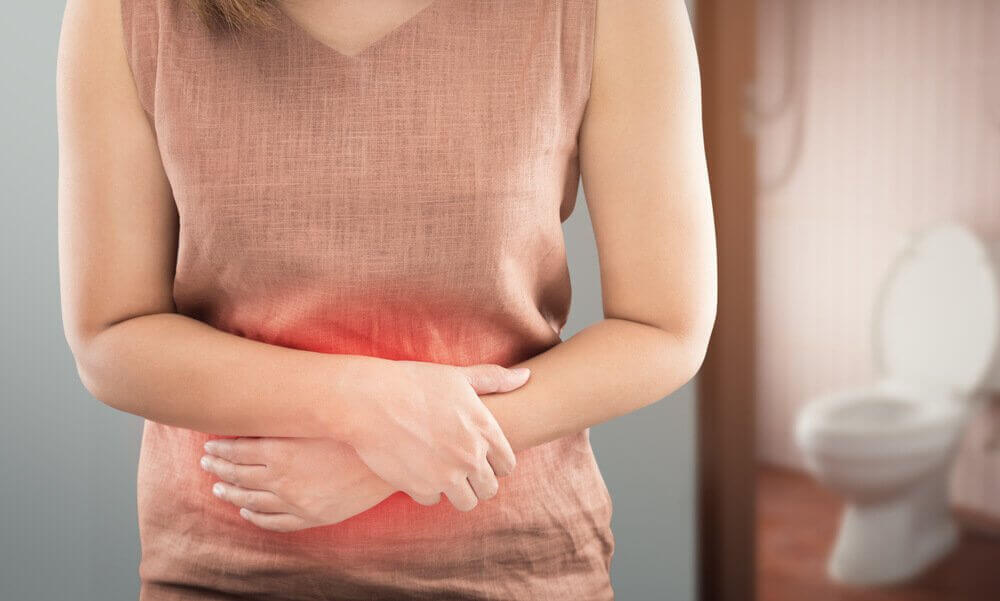Dealing with Constipation: What can you Do?

Constipation is one of the most frequent causes of medical consultations. Around 2 percent of the American population is dealing with constipation, making it the most common chronic digestive issues.
Nevertheless, many constipation complaints come from non-realistic expectations. So, what exactly are we talking about when we refer to constipation?
What is constipation?
Contrary to popular belief, humans don’t actually need to “go to the bathroom” every day. On the other hand and even though it might seem counterintuitive, even smaller-than-average stools can happen when dealing with chronic constipation. To know if you’re dealing with constipation, you should comply with the Rome Criteria.
This is a diagnostic criterion that serves to diagnose chronic functional constipation. Here’s what you and your doctor should look out for:
During three of the six months prior to diagnosis, you’ve had two or more of the following symptoms present in more than 25 percent of all bowel movements:
-
- Defecatory effort
- Hard or thin stool (colon stenosis = very thin stool).
- Feeling of incomplete evacuation.
- A sensation of blockage or anorectal obstruction.
- Digitization to facilitate defecation.
- Less than three bowel movements a week.
- Stool evacuation is rare without the use of laxatives.
- There are not enough criteria for the diagnosis of irritable bowel syndrome.
Constipation can also be a symptom of other organic pathologies. Because of this, it’s important to make sure there’s no fever, weakness or loss of blood.
Once any organic conditions are eliminated, constipation can be classified as acute, for example when traveling, or chronic, when it occurs for a longer time.
The therapeutic approach for dealing with constipation
Health education
To reduce false alarms and unnecessary anguish, it’s important to be properly educated about what “healthy” looks like.
For starters, it is not necessary to go to the bathroom every day to enjoy a good state of health. This is one of the most widespread concepts in this regard, but it’s not true.

Instead, it’s much more important to pay attention to the consistency of the stool and the effort required to emit it than to its frequency.
Overall, adding more fiber to your diet is one of the best solutions for constipation. On the other hand, creating better habits to facilitate defecation might also help. Consult with your doctor on specific recommendations tailored to your case.
How fiber can help for those dealing with constipation
The main recommendation for constipated patients is to increase fiber consumption progressively. You hear a lot about fiber, but what is it?
Fiber is the edible part of plants that cannot be digested or absorbed by the human intestine, so it passes intact to the last portion of the digestive tract, the colon. It’s beneficial for health and, depending on what proportion is fermentable in the colon, two types differ.
On the one hand, there’s soluble fiber, which is characterized by being very fermentable at the colonic level. This slows the intestinal transit, so it increases the feeling of satiety. In addition, it causes the small intestine to move slower, which means more time in contact with the intestine mucosa and increases the absorption time.
Soluble fiber is mainly found in oat bran, barley, nuts, seeds, lentils, and some fruits and vegetables. It is very beneficial against constipation, as it softens stool and improves intestinal transit. However, its use in diarrheal processes could also be of great help, since it forms a gel-like substance and in turn, this adds consistency to the stool.
On the other hand, insoluble fiber is almost not fermentable at all. Because of this, it will increase your intestinal transit, absorbing water and making stool more liquid.
Because the food moves faster through your body, nutrient absorption decreases with the increased consumption of insoluble fiber. This type of fiber is present in foods such as wheat bran, vegetables, and whole grains.
Overall, people need a healthy balance of soluble and insoluble fiber to enjoy healthy bowel movements.
If at this time you aren’t used to eating fiber consistently, it’s important to progressively add fiber to your diet. Failure to do so could cause excessive gas, bloating and even diarrhea.
Dietary recommendations for dealing with constipation
Some changes in habits that can be adopted on a daily basis if you’re dealing with constipation:
- Eat whole cereals and foods made with whole cereals.
- Take three or four pieces of whole fruit a day, with the skin.
- If you can’t eat fruit, drink juices with the pulp.
- Increase your daily vegetable intake.
- Include legumes in your menu two or three times per week. These are very rich in both types of fiber.
- Eat nuts and dried fruits. Having little water content, more nutrients are concentrated.
- Eat fiber-fortified foods. These new foods can be a great option to add extra fiber to your diet, by adding fiber extracted from other items. A very common fiber-fortified product is yogurt with fiber or even juices with extra fiber.
- Increase your water intake and keep hydrated at all times.

Dealing with constipation: physical exercise and laxatives
Both physical activity and laxatives are a common recommendation when dealing with constipation, especially if it becomes a chronic issue.
Among many patients, deficient muscle tone, lack of proper blood circulation and general inactivity can increase constipation.
Because of this, physical activity can increase muscle tone, energy, and peristalsis. This is especially true with older patients that see an improvement in the condition after incorporating at least 30 minutes of light exercise to their daily routine.
On the other hand, laxatives can also come in handy when it comes to chronic constipation. Most laxatives are considered over the counter medications and don’t need a doctor’s prescription.
Nevertheless, it’s important to control laxative intake, since their abuse can generate tolerance and dependence.
As with any health issue, it’s important to consult with your doctor if constipation becomes chronic or affects your daily activities. In the meantime, strive to keep a healthy diet and a regular exercise routine.
Constipation is one of the most frequent causes of medical consultations. Around 2 percent of the American population is dealing with constipation, making it the most common chronic digestive issues.
Nevertheless, many constipation complaints come from non-realistic expectations. So, what exactly are we talking about when we refer to constipation?
What is constipation?
Contrary to popular belief, humans don’t actually need to “go to the bathroom” every day. On the other hand and even though it might seem counterintuitive, even smaller-than-average stools can happen when dealing with chronic constipation. To know if you’re dealing with constipation, you should comply with the Rome Criteria.
This is a diagnostic criterion that serves to diagnose chronic functional constipation. Here’s what you and your doctor should look out for:
During three of the six months prior to diagnosis, you’ve had two or more of the following symptoms present in more than 25 percent of all bowel movements:
-
- Defecatory effort
- Hard or thin stool (colon stenosis = very thin stool).
- Feeling of incomplete evacuation.
- A sensation of blockage or anorectal obstruction.
- Digitization to facilitate defecation.
- Less than three bowel movements a week.
- Stool evacuation is rare without the use of laxatives.
- There are not enough criteria for the diagnosis of irritable bowel syndrome.
Constipation can also be a symptom of other organic pathologies. Because of this, it’s important to make sure there’s no fever, weakness or loss of blood.
Once any organic conditions are eliminated, constipation can be classified as acute, for example when traveling, or chronic, when it occurs for a longer time.
The therapeutic approach for dealing with constipation
Health education
To reduce false alarms and unnecessary anguish, it’s important to be properly educated about what “healthy” looks like.
For starters, it is not necessary to go to the bathroom every day to enjoy a good state of health. This is one of the most widespread concepts in this regard, but it’s not true.

Instead, it’s much more important to pay attention to the consistency of the stool and the effort required to emit it than to its frequency.
Overall, adding more fiber to your diet is one of the best solutions for constipation. On the other hand, creating better habits to facilitate defecation might also help. Consult with your doctor on specific recommendations tailored to your case.
How fiber can help for those dealing with constipation
The main recommendation for constipated patients is to increase fiber consumption progressively. You hear a lot about fiber, but what is it?
Fiber is the edible part of plants that cannot be digested or absorbed by the human intestine, so it passes intact to the last portion of the digestive tract, the colon. It’s beneficial for health and, depending on what proportion is fermentable in the colon, two types differ.
On the one hand, there’s soluble fiber, which is characterized by being very fermentable at the colonic level. This slows the intestinal transit, so it increases the feeling of satiety. In addition, it causes the small intestine to move slower, which means more time in contact with the intestine mucosa and increases the absorption time.
Soluble fiber is mainly found in oat bran, barley, nuts, seeds, lentils, and some fruits and vegetables. It is very beneficial against constipation, as it softens stool and improves intestinal transit. However, its use in diarrheal processes could also be of great help, since it forms a gel-like substance and in turn, this adds consistency to the stool.
On the other hand, insoluble fiber is almost not fermentable at all. Because of this, it will increase your intestinal transit, absorbing water and making stool more liquid.
Because the food moves faster through your body, nutrient absorption decreases with the increased consumption of insoluble fiber. This type of fiber is present in foods such as wheat bran, vegetables, and whole grains.
Overall, people need a healthy balance of soluble and insoluble fiber to enjoy healthy bowel movements.
If at this time you aren’t used to eating fiber consistently, it’s important to progressively add fiber to your diet. Failure to do so could cause excessive gas, bloating and even diarrhea.
Dietary recommendations for dealing with constipation
Some changes in habits that can be adopted on a daily basis if you’re dealing with constipation:
- Eat whole cereals and foods made with whole cereals.
- Take three or four pieces of whole fruit a day, with the skin.
- If you can’t eat fruit, drink juices with the pulp.
- Increase your daily vegetable intake.
- Include legumes in your menu two or three times per week. These are very rich in both types of fiber.
- Eat nuts and dried fruits. Having little water content, more nutrients are concentrated.
- Eat fiber-fortified foods. These new foods can be a great option to add extra fiber to your diet, by adding fiber extracted from other items. A very common fiber-fortified product is yogurt with fiber or even juices with extra fiber.
- Increase your water intake and keep hydrated at all times.

Dealing with constipation: physical exercise and laxatives
Both physical activity and laxatives are a common recommendation when dealing with constipation, especially if it becomes a chronic issue.
Among many patients, deficient muscle tone, lack of proper blood circulation and general inactivity can increase constipation.
Because of this, physical activity can increase muscle tone, energy, and peristalsis. This is especially true with older patients that see an improvement in the condition after incorporating at least 30 minutes of light exercise to their daily routine.
On the other hand, laxatives can also come in handy when it comes to chronic constipation. Most laxatives are considered over the counter medications and don’t need a doctor’s prescription.
Nevertheless, it’s important to control laxative intake, since their abuse can generate tolerance and dependence.
As with any health issue, it’s important to consult with your doctor if constipation becomes chronic or affects your daily activities. In the meantime, strive to keep a healthy diet and a regular exercise routine.
All cited sources were thoroughly reviewed by our team to ensure their quality, reliability, currency, and validity. The bibliography of this article was considered reliable and of academic or scientific accuracy.
- Zolezzi Francis, Alberto. “Las enfermedades funcionales gastrointestinales y Roma III.” Revista de Gastroenterología del Perú 27.2 (2007): 177-184
- Salas-Salvadó J et al., eds. Nutrición y dietética clínica. Elsevier Health Sciences, 2019
- De Vega, JC. “Tratamiento del estreñimiento.” Matronas Profesión 4.13 (2003)
This text is provided for informational purposes only and does not replace consultation with a professional. If in doubt, consult your specialist.








